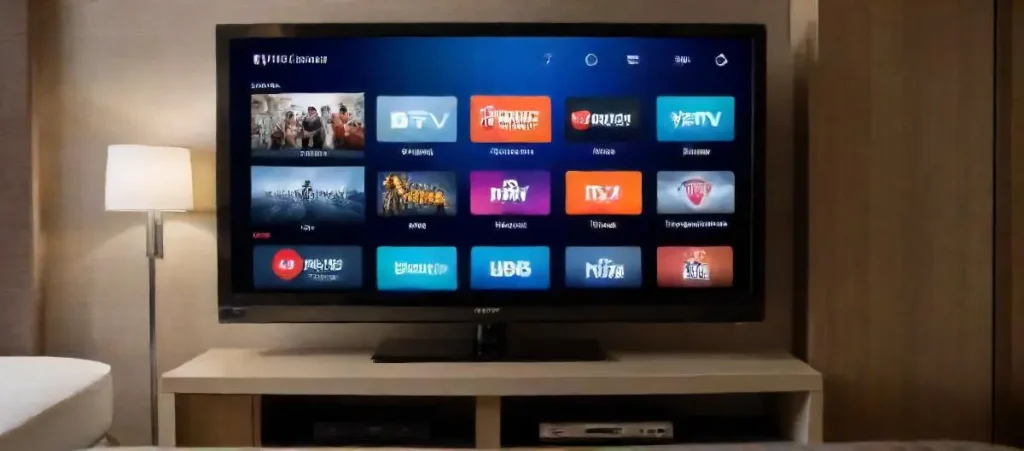The hospitality industry thrives on delivering exceptional guest experiences. In today’s digitally driven world, hotels are constantly seeking innovative ways to elevate their offerings and meet the evolving expectations of tech-savvy travelers. Enter IPTV – Internet Protocol Television – a transformative technology revolutionizing how hotels entertain, engage, and cater to their guests.
In simple terms, IPTV delivers television content over the internet instead of traditional cable or satellite connections. Think of it like streaming your favorite shows on Netflix or Hulu, but specifically tailored for a hotel environment.
Imagine a high-speed internet connection acting as the pipeline, carrying a vast library of TV channels, movies, and other multimedia content. This content is stored on a centralized server within the hotel and distributed to guest rooms through the existing network infrastructure.
The adoption of IPTV brings a plethora of benefits for hotels, ranging from enhancing the guest experience to improving operational efficiency. Let’s delve into some of the key advantages:
IPTV empowers guests to access a vast library of on-demand movies, TV shows, and music streaming services, just like they would at home. Imagine offering curated content based on their preferences, creating a truly personalized entertainment experience.
Gone are the days of static TV guides. IPTV allows guests to browse an interactive program guide, set reminders for their favorite shows, and even access hotel information, room service menus, and local attractions directly on their TV screen.
With IPTV, hotels can easily manage and update their content library from a central location. This eliminates the need for physical DVDs, cable boxes in every room, and simplifies the process of adding or removing channels.
IPTV systems can be integrated with room management systems, allowing for automatic shut-off of TVs and other devices when the room is unoccupied, contributing to significant energy savings.

Real-world examples illustrate the transformative power of IPTV in action:
A boutique hotel implemented IPTV and witnessed a significant increase in guest satisfaction scores. Guests raved about the personalized entertainment options and the convenience of accessing hotel information directly from their TV screens.
A luxury resort switched to IPTV and streamlined its content management processes. They were able to easily update channels, offer on-demand movies, and provide tailored information to guests in different languages, improving operational efficiency and guest communication.
While the benefits are numerous, hotels need to be mindful of certain challenges when considering IPTV:
Implementing an IPTV system requires an upfront investment in hardware, software, and network infrastructure.
A robust and reliable network infrastructure is crucial for seamless IPTV delivery. Hotels may need to upgrade their existing network to handle the increased bandwidth demands.
The future of IPTV in hospitality is bright, driven by continuous innovation and evolving guest expectations.
IPTV systems are increasingly being integrated with other smart hotel technologies, such as in-room control systems, voice assistants, and mobile apps, to create a truly connected and personalized guest experience.
As travelers increasingly seek personalized experiences, IPTV provides hotels with the platform to tailor entertainment, information, and services to individual guest preferences.
IPTV is revolutionizing the hospitality industry, empowering hotels to deliver exceptional and personalized guest experiences while optimizing operational efficiency. By embracing this transformative technology, hotels can gain a competitive edge, enhance guest satisfaction, and position themselves for success in the ever-evolving digital landscape.
IPTV delivers television content over the internet, while traditional cable TV uses coaxial cables. IPTV offers more flexibility, customization options, and interactive features.
Yes, IPTV solutions are scalable and can be tailored to fit the needs and budget of hotels of all sizes, including boutique hotels and smaller properties.
A reliable and high-speed internet connection is essential for seamless IPTV streaming. Fiber optic internet is often the preferred choice for its high bandwidth capacity.
Yes, many IPTV systems allow guests to securely access their personal streaming accounts directly on their hotel room TV.
Yes, reputable IPTV providers offer secure systems with encryption and access controls to protect guest privacy and data.

Copyright © 2026 "NetTV" - All Right Reserved

